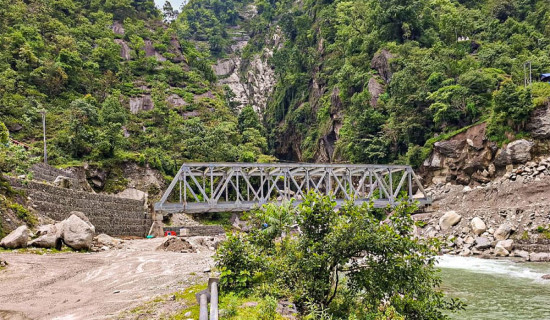- Saturday, 7 June 2025
Super Year Of Democratic Elections
This year 2024 has been the super year for elections. More than a billion registered voters alone across the countries of Asia-Pacific region in particular voted in a slew of elections held this year coming to a close next week. At the beginning of the year, Bangladesh conducted polls in January right after the beginning of the year 2024 under an opposition boycott and international pressure on Prime Minister Sheikh Hasina to ensure a free and fair vote. The election was in deed a repeat of the 2014 polls also alleged as "one-sided” and grossly manipulated assuring victory to Sheikh Hasina. This one-sided and manipulated elections in Bangladesh incurred the wrath of the people which finally led to the unceremonious exit of the prime minister herself.
Likewise, Pakistan held general elections in February this year following a prolonged political instability and stalemate. The polls indicated that Imran Khan and his Pakistan Tehreek-e-Insaf (PTI) enjoyed widest popularity despite the authority crackdown and confrontation with the powerful military establishment. Even though Khan was barred from filing candidacy and his party has been sidelined, he seems to be the popular leader in Pakistan currently. Immediately following the election held in Pakistan, more than 200 million people cast ballots in Indonesia's election, making it the world's largest direct presidential vote. To follow, in April, South Koreans voted in legislative elections.
Mandate
Most important election in the world's most populous nation and largest democracy was held in India. Prime Minister Narendra Modi and his Bharatiya Janata Party (BJP) sought a third straight five-year term in power. India has a staggering 950 million registered voters. In an effort to mount a stronger challenge against the BJP, over two dozen opposition parties had formed an alliance called INDIA -- short for the Indian National Developmental Inclusive Alliance. The group included the main opposition party, the Indian National Congress, which hoped to return to its heyday as the country's dominant party. But BJP-led National democratic Alliance won the elections with diminished majority. Likewise another South Asian country Sri Lanka hosted polls that elected new president and parliament.
The 2024 U.S. presidential election held in November gave Donald Trump the mandate to rule for the next four years. Trump argued that another term for Democrats whose presidential candidate was Kamala Harris will allow the liberal globalists to destroy the U.S. economy and way of life. His message persuaded the voters to give popular backing to him to get elected as president. President Andrés Manuel López Obrador’s successor Claudia Sheinbaum won a strong majority in Mexico, and South Africa’s African National Congress lost its parliamentary majority for the first time since the end of apartheid. Likewise, elections have taken place in El Salvador, Iran, Mongolia and the United Kingdom.
John K. Klenn, a political analyst, in an article published in the widely read Journal of Democracy, recently mentions that three electoral trends are emerging in the contemporary global political realm. First, authoritarian regimes continue to rely on sham elections to create the illusion of legitimacy. Second, frontline democracies are offering important lessons about how to inoculate citizens from the challenge of foreign information manipulation. And third, the threat of AI is not its capacity to deceive people to switch their votes, but instead it may lead to undermine popular trust in elections and democracy.
Moreover, a study by International IDEA found that in eleven of the nineteen countries surveyed, a dominant majority of the people say that the most recent election in their country was not free and fair. The democratic elections held periodically in a democracy are predicated upon the premise that those governed should be allowed to have their say and participation in choosing their representatives to govern. Moreover, such democratic exercises are important to make the relationship between state and citizens further legitimised, consolidated and strengthened. It also offers structures and spaces of interfaces between ordinary citizens and their representatives.
But the interface between citizen and their representatives has not been adequately facilitated and fostered despite electoral exercise conducted every five year. The state authorities including the elected representatives, however, spare little time to communicate and dialogue with citizen stakeholders and give a hearing to their interests, concerns and grievances. The governing mechanism and process is skewed against the interests and aspirations of citizens. The policy legislation process is bureaucratic and top down that the apex organs of the government such as executive and legislatures rarely do consult with sub national governments while formulating policies.
Civic aspirations
The subnational government stakeholders do complain time and again that the central government has bypassed and encroached upon their jurisdictions. Holding consultation with citizen stakeholders and soliciting views of civic forums and groups on the issues of general interests is rarely carried out. As a result, civic aspirations have been neglected while taking administrative decision and enacting laws in the parliament. Like many other democratic countries stated above where periodic elections are conducted, Nepal enjoys an enabling legal framework for free and fair elections. The institutional and legal infrastructure like Right To Information Act, Local Government Operation Act, Good Governance (Management and Operation) Act and National Information Commission, among others, are in place.
However, their implementation is weak and poor. As a result, public organisations and agencies fail to deliver services to the people. Moreover, they are not subjected to civic scrutiny, sanction and discipline for their non-performance. The absence of the informed democratic dialogue, deliberation and inputs has created problems. It shows that periodic elections alone are not sufficient for the effective working of democracy. In order to make democratic polity vital and vibrant, participatory democracy needs to be institutionalised.
(The author is presently associated with Policy Research Institute (PRI) as a senior research fellow. rijalmukti@gmail.com)















